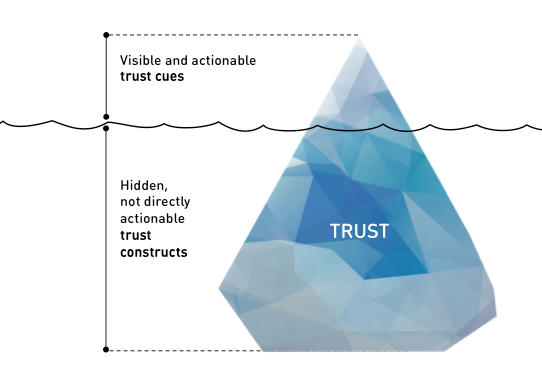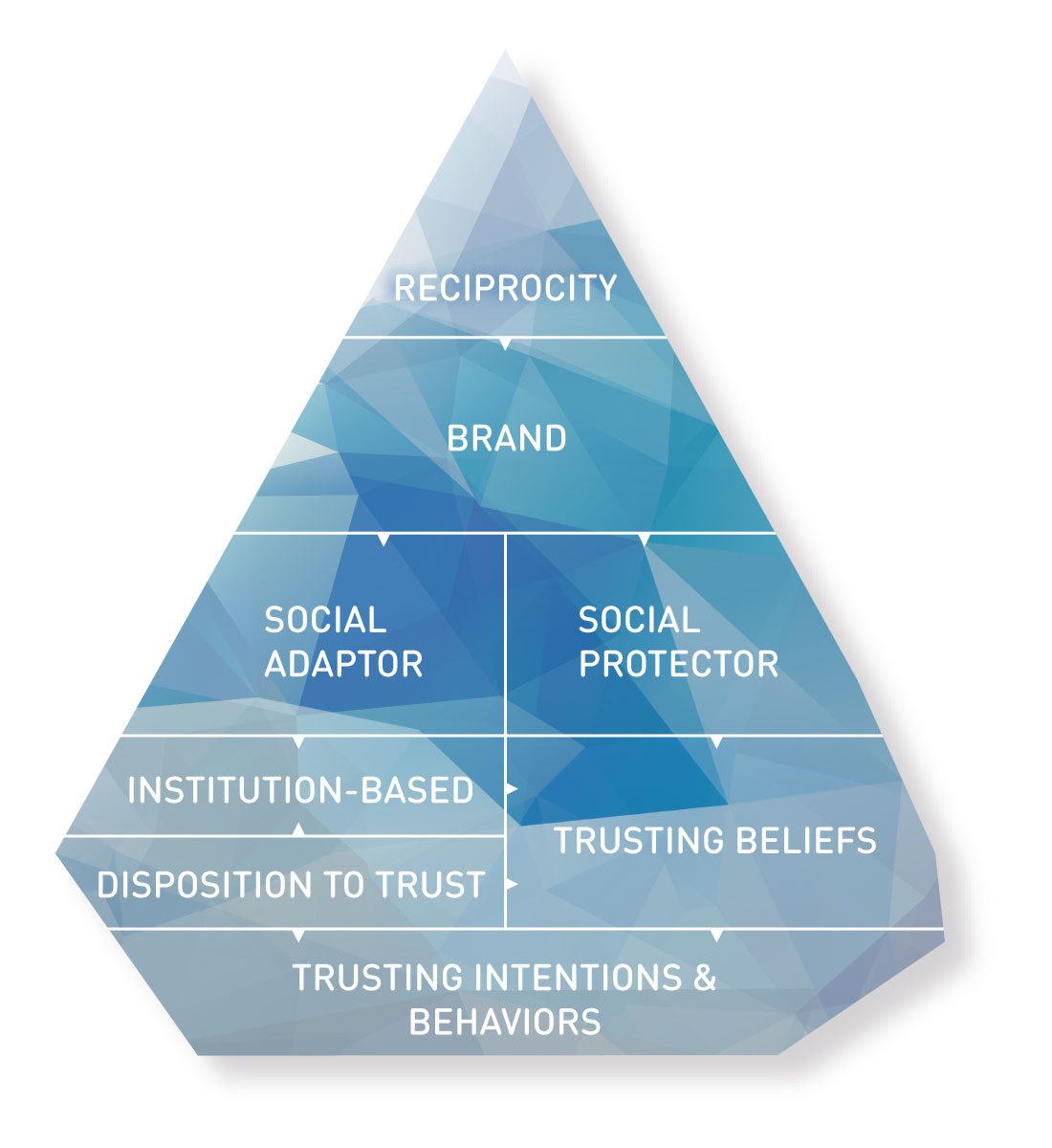Trust is the currency of today and will be central to defining the winners of tomorrow.
When did we start trusting machines?
Discover how trust works and why we need it
Start Learning for FreeHow we can help

The human-machine trust gap
Since AI’s effectiveness and reliability depend on access to vast amounts of real-world data, companies and users face a paradox: they must build and rely on machines they don’t fully trust to achieve better outcomes. Bridging the trust gap requires a solid understanding of the concept of trust. This is a crucial prerequisite for confidently embracing the transformative potential of technology.
Human-machine trust refers to the confidence individuals place in a machine’s intelligence, believing it is reliable, effective, and capable of helping them achieve their goals.
Why we need to care about human-machine trust
In today’s fragmented, multi-channel landscape, businesses must capture both the hearts and minds of consumers to attract and retain their loyalty.
Building a trust-based relationship, rooted in empathy and genuine connection is essential for success.
Although today’s internet users are very much concerned about privacy and the integrity of their business partners, two third of consumers globally are willing to share additional personal data in exchange for additional services or discounts.
Most companies are strategically unprepared to respond effectively to the public controversies that accompany data privacy and AI-related criticisms. Digital leaders like Meta and Uber are struggling to comply with upcoming requirements for transparency and accountability. In order to still be able to harness the evident value of data, companies must follow a new paradigm. They need to understand and manage trust.
Our TrustCast is live on Spotify
Iceberg TrustCast explores the hidden layers of digital trust in our AI-driven world. Each episode dives beneath the surface of transparency and privacy to uncover the deeper dynamics shaping trust in technology—data ethics, algorithmic accountability, consumer psychology, and responsible innovation. Featuring expert insights from neuroscience, behavioral economics, and digital strategy, this podcast is essential listening for leaders, technologists, and innovators building ethical, human-centered digital futures. Trust is the new infrastructure—learn how to build it.
The iceberg framework helps you to understand, enable and engender trust
customer data, companies need to master
three capabilities:
foundations to successfully enable trust
cues. This involves primarily identifying
and effectively evaluating options in form
of use cases and testing these cases
rapidly in prototypes.
understanding of how trust is built and ofexisting and potential trust issues.Organizations would be wise to first listenand learn.
a governance and operating structure that
allows managing and optimizing initiatives
and ultimately engendering trust.
Research by Accenture shows finds that 77% of executives believe that unlocking AI’s full potential will only be achievable when it is built upon a strong foundation of trust (2025).
Accenture’s Technology Vision for 2025 highlights that earning people’s trust in AI to function as intended and fairly—beyond technical performance—is a vital priority for digital leaders.
Intrinsically married to the idea of autonomy is an underpinning of trust - and for enterprises, it’s trust that will be the biggest backstop to tomorrow’s growth (Accenture, 2025)
BCG identifies data privacy and security as the top AI challenges businesses must navigate (2025). Two-thirds of asked executives place this risk among their top three priorities.
OUR STRATEGIC TRUST FRAMEWORK

Online trust and the iceberg metaphor
The digital economy and its data-driven business models are on a journey towards trust-based customer relationships. The most critical and fragile enabler for this transformation is trust.
Trust is the result of a calculation process – sometimes deliberate, sometimes more intuitive. Customers screen signals from online vendors and decide whether to take the risk to get vulnerable to the actions of another party or not. Generally, these trust cues are visible and actionable.
However, the formation of trust is also largely driven by cognitive structures that are not directly actionable. In our metaphor, these trust constructs lie below the waterline.

A framework that helps to understand online trust
Based on insights from socio- and neuroeconomic research, the Iceberg Trust Model provides a fresh understanding of how online trust and trust in AI are built. While significant progress has been made in analyzing trust in digital interactions, this model goes a step further. It offers a comprehensive framework that not only explains how users develop trust online or in AI but also pinpoints actionable strategies for businesses to influence and foster that trust.
Trust plays a central role in helping consumers overcome perceptions of risk and insecurity (McKnight, 2002)

The “balancing act” of competing business interests and privacy requirements will be of increasing importance in the near future. Marketing often takes advantage of the consumer’s bounded rationality and well-known cognitive biases. Such a rather opportunistic approach in digital markets and AI is not sustainable.
Electronic markets have the potential to reduce information asymmetry and transaction costs substantially. AI will increase productivity and change professional work-life as we know it. Together, they offer effective opportunities to gain insights into the needs and behaviours of customers. Extracting these insights requires respectful and farsighted handling of personal data. The digital revolution, with its explosive growth of data and system complexity, is about to transform industries again. In order to harness the potential of data and AI, the digital economy and its data-driven business models must journey towards trust-based customer relationships.
It all starts with a better understanding of digital trust.
Meet the team!
The iceberg.team is a netwotk of data professionals hand picked to effectively build data-driven products and services.
What it is all about…
Earning genuine trust demands we stand naked: Reciprocal vulnerability alongside product and service excellence and Public Leadership.
Robert Phillips - https://www.ft.com/content/172832e4-18c8-11e5-8201-cbdb03d71480
The purely economic man is indeed close to being a social moron. Economic theory has been much preoccupied with this rational fool.
Richard Thaler (2016) - https://newbookrecommendation.com/summary-of-misbehaving-the-making-of-behavioral-economics-by-richard-h-thaler/
Trust acts as a bridge from imperfect knowledge to confident action.
Lukyanenko et al. (2022) - https://link.springer.com/article/10.1007/s12525-022-00605-4
"Trust is inherently probabilistic, due to the involvement of risks which in themselves have uncertain outcomes."
Volker Patent (2016) - http://programme.exordo.com/fint2016/delegates/presentation/79/
Trust is an input condition in social systems by which supportive and collaborative activities can be encouraged in situations of uncertainty or risk.
Luhmann, 1988
"Trusting behaviour involves relinquishing control over outcomes valuable to the self"
Tanis, Postmes, 2005 - http://onlinelibrary.wiley.com/doi/10.1002/ejsp.256/abstract
"Dubium sapientiae initium - Doubt is the origin of wisdom"
René Descartes
"The trust factor opens or closes down the pace and nature of electronic commerce growth"
Keen et al. 1999
"We are what we think. All that we are arises with our thoughts. With our thoughts we make the world"
The Buddha, quoted in the Dhammapada
"We can't solve problems by using the same kind of thinking we used when we created them."
Albert Einstein
"We're not productive any more. We don't make things any more. It's all automated. What are we for, then? We're consumers, Jim."
Twelve Monkeys, 1995







